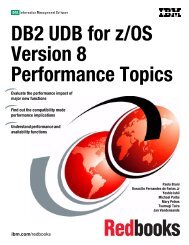Redpaper - IBM Redbooks
Redpaper - IBM Redbooks
Redpaper - IBM Redbooks
Create successful ePaper yourself
Turn your PDF publications into a flip-book with our unique Google optimized e-Paper software.
In this instance, you should consider incorporating a policy for “cleaning up”<br />
these messages.<br />
One aspect of the availability of messages on shared queues which you should<br />
consider is the effect of using a two-phase commit. For example, consider a unit<br />
of work which retrieves a message from a shared queue, updates a DB2 table<br />
based on the contents of the message, and returns a response to a shared<br />
queue. A 2pc protocol is used to ensure that either all or none of the processing<br />
happens, typically coordinated by Resource Recovery Services (RRS). If the<br />
queue manager where this unit of work is running were to fail during the<br />
two-phase commit, it is possible that the unit of work would be left indoubt in<br />
WebSphere MQ.<br />
In this case, the correct resolution of the unit of work cannot be determined until<br />
the queue manager is restarted and can reconnect with RRS. It is therefore not<br />
possible for the other queue managers to perform peer recovery for this unit of<br />
work (this means, the input message cannot be rolled back by a peer for<br />
processing via a different queue manager which has an impact on the availability<br />
of the messages consumed and produced by that indoubt unit of work). The<br />
availability of other messages on the shared queue is not impacted unless<br />
serialization tokens are being used to ensure an ordering of processing<br />
messages on this queue. This is further explained in WebSphere MQ for z/OS<br />
System Administration Guide V5.3.1, SC34-6053-01.<br />
Note: When messages are put to a shared queue, the data is logged on a<br />
particular queue manager, but that process does not cause any kind of<br />
message affinity to a queue manager. The affinity is between a unit of work<br />
and a queue manager.<br />
Table 2-3 outlines the issues you should consider when looking at shared queues<br />
to support a highly available environment.<br />
Table 2-3 Advantages and disadvantages of using WebSphere MQ shared queues<br />
Advantages Disadvantages<br />
Resilient support of HA over multiple<br />
LPARs. Should a queue manager or a<br />
Message Broker fail, other brokers<br />
continue to retrieve messages.<br />
Maximum message size of 63 KB. Even if<br />
a current system does not have messages<br />
of that size or above, it places a restriction<br />
on the natural growth of the system.<br />
However, this restriction is increased to<br />
100 MB in the next release of WebSphere<br />
MQ by further using DB2.<br />
16 High Availability z/OS Solutions for WebSphere Business Integration Message Broker V5

















